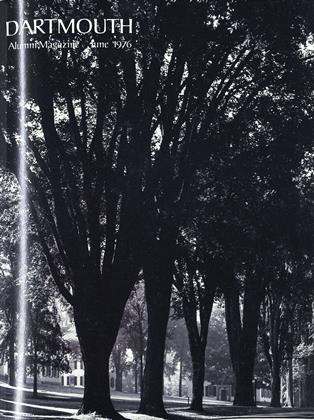i
The light we save - and have to spare - by early June, at least, has proved so often only middling fair, it has from time to time behooved
the weather-watch to give the lie to those who say, as if they knew, "You have two seasons here, July the Fourth and winter." It is true,
our springs are hardly ever much to boast of, three or four bright days together, mild enough to touch the fields with green and loose a haze
of shadblow, first, before we hear the peepers. Still, the days increase: the little freshets disappear; the clouds go over, like the geese;
the leaves crowd in on all our view. Our winds veer north, then due southwest, and local matters and a few odd jobs concern us for the rest
of May. We let the line storm blow itself to pieces with the same bemused forbearance we can show outsiders who discount our claim:
New England is as much a state of mind as it has ever been; and though for several years of late summer has run a little thin,
October lingers on so mild and golden we must almost seem too idle not to be beguiled like Midas. Not that we would dream
of any world that lacked the change to which we're bred. However old we grow, it would be passing strange for us to say we are so cold
we fear the winter coming on when the December solstice burns the daylight down, and, all but gone, it whitens, and the cycle turns.
II
"There is the world," we said, "maybe for good - or ill, maybe." But if, to our surprise, we seem at times to have misunderstood what brings it round to us, the light that lies due east, at first, then almost overhead, has pleased us well enough from day to day. And should there be occasion now to dread its going, we have learned of late to say, "The world is there, and likely will be when we all are gone." The early morning light more certain than the means we make our ways should signify as much to other men and give them, whether we were wrong or right, as good a reason for a kind of praise.
III
The Perseids
We cannot quite make out the message, though we try. In August, if it's clear, the middle of the sky
past midnight is a text of dots and dashes bright and steady like your voice. But what it tells or might
explain is hard to say. We probably can't know. Sometimes the flashings make a grid for ticktacktoe
the dark rubs out before we have a chance to play our O against their X. Whatever else they may
be, they are less than stars or planets that burn on like Mars and Jupiter into the dusky dawn ....
Still, in the course of things, however brief a span they may appear to have, they are as old as man:
their orbit seems defined, and whether we are here to wonder at their light, they will be back next year.
Poet and Professor of English at Northeastern University.Morse wrote "Recognitions" for the 40th reunion thismonth of the Class of 1936.
 View Full Issue
View Full Issue
More From This Issue
-
 Feature
FeatureA four-and -a-half-ounce magic totem pole
June 1976 By NORMAN MACLEAN -
 Feature
FeatureTHE OLD ROMAN SPEAKS TO US STILL
June 1976 By DAVID SHRIBMAN -
 Feature
Feature231 Years for Dartmouth
June 1976 -
 Feature
FeatureCommencement
June 1976 By JAMES L. FARLEY -
 Article
ArticleCollege with an Upper-case "C"
June 1976 -
 Class Notes
Class Notes1959
June 1976 By DOUGLAS WISE







